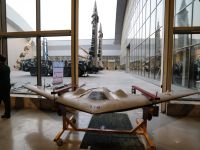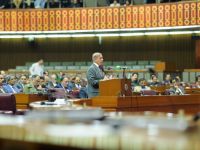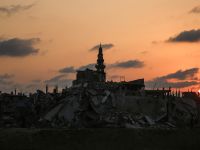Palestinian leader Yasser Arafat headed to Washington Thursday to press outgoing President Bill Clinton to agree to the deployment of international peacekeepers in the Palestinian territories after six weeks of deadly violence.
Arafat is hoping to overcome US coolness towards proposals for international forces in the West Bank and Gaza Strip, which have been transformed into purgatories of lethal gun battles and where the caustic mix of tear gas, exploded munitions and burning tires hangs thick most days.
The Palestinian leader -- emboldened by the latest Intifada or uprising that has left more than 180 people dead and seen almost nightly Israeli tank and helicopter raids on Arab towns -- also wants to broaden an international fact-finding commission to investigate what Palestinians brand massive Israeli abuses of power and "war crimes."
The violence erupted after a controversial high-profile visit on September 28 to a holy Muslim and Jewish site in Jerusalem by hawkish Israeli opposition leader Ariel Sharon.
"We submitted a request to the United Nations some 10 days ago that they afford the Palestinian people an international protection," Arafat said Tuesday. "We have a right (to protection) as in all countries subjected to aggression."
On his way to Washinton, Arafat traveled to Cairo for talks with President Hosni Mubarak, with a stopover too in Britain for a brief meeting with Prime Minister Tony Blair to update him on the Middle East turmoil.
Arafat is due to meet Clinton in Washington Thursday and the US President will hold separate talks with Israeli Prime Minister Ehud Barak on Sunday.
"We demand international monitoring forces, mobile units that can be deployed to areas of Israeli aggressions," top Palestinian negotiator Saeb Erakat said Tuesday before heading to Washington.
"The Israeli soldiers are committing war crimes and should be tried," he said.
The United States signaled Monday it would be willing to consider the appeals for an international force to patrol in the West Bank and Gaza, backing off of an earlier categorical rejection of the idea.
However, it has said the force must be approved by both sides.
And Barak, who last month declared a "time out" in the seven year peace process with the Palestinians, has said he "adamantly opposes" the proposals, saying an international force could worsen the situation.
Amidst the moves to quell the bloodletting, one that could likely give momentum to the Washington talks: the United States Tuesday named members of an international fact-finding panel to investigate the tumult.
The five-member commission is to be headed by former US senator George Mitchell, who served as mediator in the Northern Ireland peace talks, and has been described by Erakat as a welcome choice.
Erakat said the Palestinians would seek to "add names to the list" to include such high-profile figures as the former South African president Nelson Mandela.
The panel "will provide an independent and objective review of the current crisis with the goal of preventing its recurrence," the White House said, stressing that for it to succeed both Israel and the Palestinians must fully implement the understandings reached at a summit in the Egyptian resort of Sharm el-Sheikh in October.
"The immediate priority (of the talks) must be to implement all of the provisions of the Sharm el-Sheikh agreement, particularly those aimed at stopping the violence and the bloodshed," the White House said -- JERUSALEM (AFP)
© 2000 Al Bawaba (www.albawaba.com)







